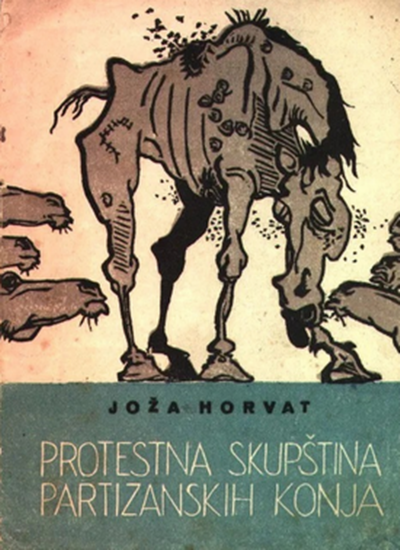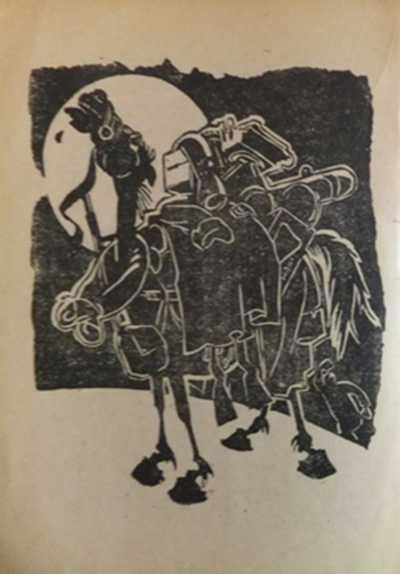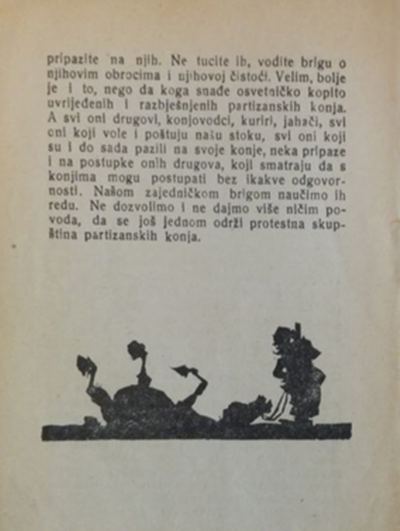Joza Horvat's Protest Assembly of Partisan Horses (bonus part)

In the memoir literature about the Partisan People’s Liberation Struggle in Yugoslavia, horses are the most frequently mentioned animals. Often there are emotionally charged references to the crucial support provided by horses to civilians and soldiers on their wartime journeys. I have had a favorite little story about a Partisan horse for years now, so I will include it here as an illustration of the previous sentences. Then, I will turn to Joža Horvat’s 1944 booklet Protestna skupština partizanskih konja [Protest Assembly of Partisan Horses].
“My” story is about being wounded, and it is told by an unnamed Partisan soldier:
It hit me in both legs, and I fell off my horse. Zvrk was also wounded in the leg. He carried me and dragged me, holding my coat with his teeth, and little by little, limping, he dragged me to my comrades. They bandaged me, my bones were not injured, so I was sent to the hospital together with the lightly wounded. We also brought Zvrk. …
But you already know. What is a horse with three good legs? … They wanted to kill him with a pistol, but I didn’t let them. He was living in a plum orchard, I brought him bread and sugar, but his heart was breaking in his powerful chest at the sight of the expanses, which started right behind the fence. He collapsed one morning in that orchard, when his heart completely broke.
That’s how my Zvrk died quietly in the Partisan hospital, and I cried while digging his grave and burying him.
They said that I flipped because of a fall from my horse and because of the pain and fear, but, you see, I am completely normal.
It was completely normal for many participants of the Partisan struggle to care for their horses and grieve when the moment of parting came. But there were horses who, apart from the fact that they were often hungry and thirsty like their owners—and horses were regularly used as food when other food supplies were exhausted—also served as packhorses. They carried military commanders, the wounded and disabled, food supplies and kitchen utensils, as well as machine guns and ammunition. In general, they carried everything that could be loaded onto them.
In the name of all such horses, Horvat in his characteristic humorous manner wrote a short booklet. In it, following the numerous different assemblies held by the Partisans and their supporters throughout the war, the horses decide to hold theirs to complain about their misfortunes. One of the present horses explains: “In the brigade, I no longer look like a horse. They turned me into a two-humped camel, loaded on me everything and anything, and how they feed us and give us water, you have already heard from my precursors.”
As if carrying all the cargo was not enough, the horse complained—that is, the author mocked: “Partisans … throw their cloaks on us, hang rifles, purses, and flasks, and while we squirm under the burden, they walk beside us and sing songs.”
Although the booklet Protest Assembly of Partisan Horses was written in a way that would entertain the Partisans and make them laugh, it also had an educational dimension. At the very end, the author advised all the readers not to beat their horses, and to take care of their nutrition and cleanliness, if for no other reason than to prevent such an assembly of horses from taking place again.


Illustrations in the booklet: Vlado Kristl.
Bibliography
Horvat, Joža. Protestna skupština partizanskih konja [Protest Assembly of Partisan Horses]. Crna Lokva na Petrovoj gori: Naprijed, 1944.
Ribnikar, Jara. Život i priča I-II [Life and Story I-II]. Belgrade: Prosveta and Srpska književna zdruga; Sarajevo: Veselin Masleša; Zagreb: Mladost, 1986.
